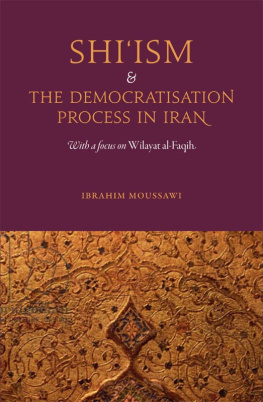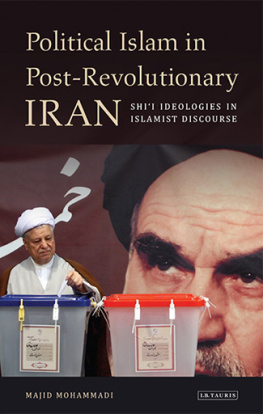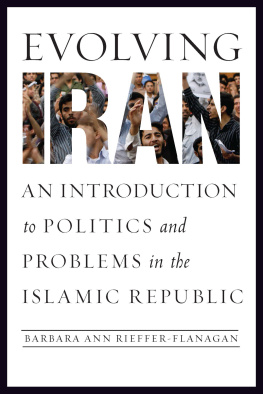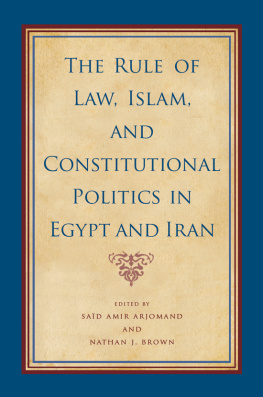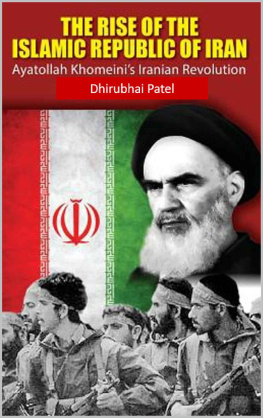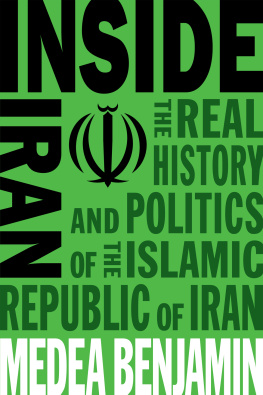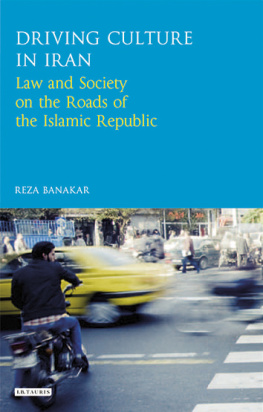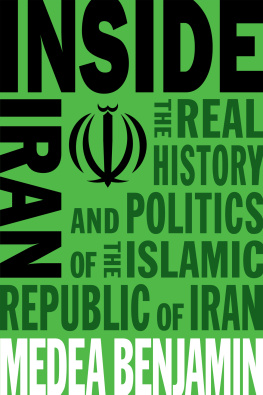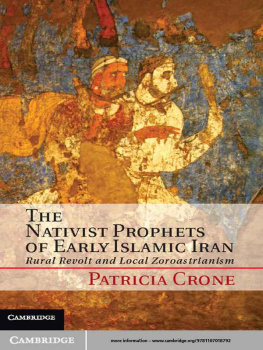eISBN 978-0-86356-831-2
First published 2011 by Saqi Books
This eBook edition published 2011
Ibrahim Moussawi 2011
All rights reserved. No part of this book may be reproduced or transmitted in any form or by any means, electronic or mechanical, including photocopying, recording or by any information storage and retrieval system, without permission in writing from the publisher.
This book is sold subject to the condition that it shall not, by way of trade or otherwise, be lent, re-sold, hired out, or otherwise circulated without the publishers prior consent in any form of binding or cover other than that in which it is published and without a similar condition including this condition being imposed on the subsequent purchaser.
A full CIP record for this book is available from the British Library.
A full CIP record for this book is available from the Library of Congress.
SAQI
26 Westbourne Grove, London W2 5RH
www.saqibooks.com
Introduction
With the emergence of the Islamic Republic of Iran in 1979, and the introduction of what was perceived as a new political ideology, observers, particularly in the West, were faced with several questions, the most basic of which were: What does this concept of wilayat al-faqih mean, where did it come from and what are the implications of its implementation in Iran?
Events surrounding the disputed elections of 2009, moreover, threw into sharp relief the debate over whether Islam and democracy could cohere. To some observers, it even called into question the philosophy of wilayat al-faqih itself. Coming as it did just after Iran had celebrated the thirtieth anniversary of the 1979 revolution, the contested re-election of Ahmadinejad as president prompted unprecedented levels of protests. Some were directed at political shortcomings in the running of the election, some at the sense of officially sanctioned dishonesty, some at the personalities of the politicians involved. Other protestors even seemed to question the system adopted in 1979, and advanced since the death in 1989 of Imam Ruhollah Khomeini. There was also talk that the crushing of the revolt and the arrest and occasional execution of dissidents signalled a curbing of democracy. Likewise some analysts described the return to power of Ahmadinejad as a coup by younger military and radical factions over previous power-holders, including large sections of the ulama (Islamic clergy). Conversely, the survival of both the supreme guide and the president and the assent of other parliamentarians and official councils appeared to signal that the system was stronger than foes had expected. Arguably, ran this view, wilayat al-faqih still enjoyed the support of a silent majority of ordinary Iranians.
Literally translated wilayat al-faqih means mandate of the (Islamic) jurist or guardianship of the jurist, wilaya meaning government or legal authority, combined with faqih which is the standard Islamic term for someone who interprets the law. The concept as elaborated by Imam Syed Ruhollah Khomeini (190089) is a forthright attempt to legitimise governance by Shii clergy in the temporal as well as the spiritual realm. Concretely speaking, it implied that the highest authority of the Islamic Revolution, namely the Guide or Leader (rahbar), should be one of the highest religious authorities (marja al-taqlid or authority of emulation) and the political leader, who understands his time and therefore could lead a mass movement.
Some observers have described the concept of wilayat al-faqih, or guardianship of the jurist, as a rigidly tyrannical system of governance, an authoritarian and highly centralised leadership structure that gives precedence to the whims of the rahbar. From this perspective, it is impossible to imagine a genuine process of democratisation taking root and flourishing inside the Islamic Republic of Iran. However, a careful examination of the principles of wilayat al-faqih allows for a more nuanced understanding of both the concept itself and its fluidity and ability to evolve and adapt to changing socio-political circumstances. To begin such an analysis, we must first define democratisation, which is itself a contested term, particularly in the post-11 September world.
ONE VIEW OF DEMOCRATISATION
Mahmud Haydar, a Lebanese journalist and intellectual, contends that democratisation, as a concept, entered the political and philosophical sphere in the framework of the late development of modernity. That is to say, capitalist societies in the West deemed democratisation as a necessary road that developing countries have to travel in order to reach the level of modernisation and prosperity that the First World countries enjoy. By this method, Western nations attempted to generalise their experience and impose their political, social, economic and cultural models on third world countries.
Haydar stresses that democratisation linguistically means making what is not democratic, democratic, or activating (tafil) a community that is lacking in political, economic, and social democratic practices to become on par with Western democratic practices. However, he clarifies that it is not necessary for the would-be democratic society to either follow the same path toward democracy or become a spitting image of democracy as practised in capitalist developed countries, such as the G7, for instance.
According to Haydar, the trend of promoting democratisation emerged after the end of the Cold War, which resulted in the ascendance of American liberalism as a hegemonic model over the global village. Haydar purports that the real objective of promoting democratisation is to prepare the ground for the targeted communities and countries to become amenable to fast and huge flows of capital. From this perspective, Western nations employed the terminology of democratisation as a tool to expand their hegemony over Third World countries. If this is the objective of democratisation, then the ensuing relationship would be one between an oppressor (developed countries) and oppressed (developing countries), resulting in hegemony of the strong over the weak, which runs counter to the aims of democracy.
Thus, Haydar contends, democratisation became a global phenomenon serving the interests of the Western hegemonic powers, who opted to promote radical reform in the targeted countries in order to make them able to properly function in the global capitalist system. Through this networking, democratisation not only targets political reform and periodic elections, but also extends its domains to dealing with lifestyles, proper behaviour, even religious practices. Islamic movements term this as cultural invasion, which should be stopped at all costs.
Haydar adds that after 11 September, the discourse on democratisation reached an unprecedented peak. This was concomitant with the hegemony of the neoconservatives over US foreign policy, investing in the so-called democratisation of the Middle East as a means of achieving political and security objectives. Michael Ledeen, a scholar at the American Enterprise Institute, contended that the US should employ its political, ethical and military capabilities in order to sustain a global democratisation revolution, which would emancipate the Middle East from tyranny, as he put it. Two leading neoconservative thinkers, William Kristol, editor of

